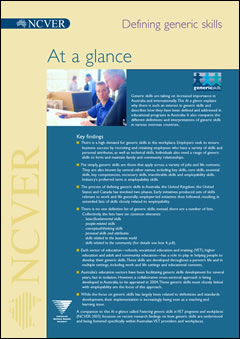Description
Generic skills are gaining importance internationally and in Australia. This 'At a glance' explains why there is such an interest in generic skills, and describes how they have been defined and addressed in educational programs in Australia. It also compares the different definitions and interpretations of generic skills in various overseas countries. A complementary publication 'Fostering generic skills in VET programs and workplaces: At a glance' is also available.
Summary
Executive summary
Generic skills are taking on increased importance in Australia and internationally. This At a glance explains why there is such an interest in generic skills and describes how they have been defined and addressed in educational programs in Australia. It also compares the different definitions and interpretations of generic skills in various overseas countries.
Key findings
- There is a high demand for generic skills in the workplace. Employers seek to ensure business success by recruiting and retaining employees who have a variety of skills and personal attributes, as well as technical skills. Individuals also need a range of generic skills to form and maintain family and community relationships.
- Put simply, generic skills are those that apply across a variety of jobs and life contexts. They are also known by several other names, including key skills, core skills, essential skills, key competencies, necessary skills, transferable skills and employability skills. Industry's preferred term is employability skills.
- The process of defining generic skills in Australia, the United Kingdom, the United States and Canada has involved two phases. Early initiatives produced sets of skills relevant to work and life generally; employer-led initiatives then followed, resulting in extended lists of skills closely related to employability.
-
There is no one definitive list of generic skills; instead, there are a number of lists. Collectively, the lists have six common elements:
- basic/fundamental skills
- people-related skills
- conceptual/thinking skills
- personal skills and attributes
- skills related to the business world
- skills related to the community.
- Each sector of education—schools, vocational education and training (VET), higher education and adult and community education—has a role to play in helping people to develop their generic skills.These skills are developed throughout a person's life and in multiple settings, including work and life settings and educational contexts.
- Australia's education sectors have been facilitating generic skills development for several years, but in isolation. However, a collaborative cross-sectoral approach is being developed in Australia, to be appraised in 2004.Those generic skills most closely linked with employability are the focus of this approach.
- While the focus on generic skills has largely been related to definitions and standards development, their implementation is increasingly being seen as a teaching and learning issue.
A companion to this At a glance called Fostering generic skills in VET programs and workplaces (NCVER 2003) focusses on recent research findings on how generic skills are understood and being fostered specifically within Australian VET providers and workplaces.
Download
| TITLE | FORMAT | SIZE | |
|---|---|---|---|
| nr2102b | 179.6 KB | Download |
Related items
Generic skills are gaining importance internationally and in Australia. This 'At a glance' explains… Show more
This at a glance looks at developments in employability skills since 2002. It finds that most resear… Show more
